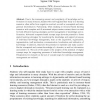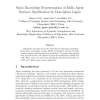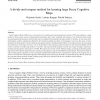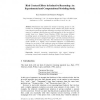75 search results - page 5 / 15 » Knowledge and Reasoning Supported by Cognitive Maps |
KNINVI
2005
Springer
14 years 1 months ago
2005
Springer
Abstract. Due to the increasing amount and complexity of knowledge and information in many domains, students who self-regulate their study in e-learning scenarios often suffer from...
DLOG
2006
13 years 9 months ago
2006
Modularity and rigor are two key elements for multi-agent technology. Hong Zhu's multi-agent system (MAS) development method provides proper language facilities supporting mo...
FSS
2010
13 years 6 months ago
2010
Fuzzy Cognitive Maps (FCMs) are a convenient tool for modeling and simulating dynamic systems. FCMs were applied in a large number of diverse areas and have already gained momentu...
RAS
2008
13 years 7 months ago
2008
Task planning for mobile robots usually relies solely on spatial information and on shallow domain knowledge, like labels attached to objects and places. Although spatial informat...
CONTEXT
2007
Springer
14 years 1 months ago
2007
Springer
Mechanisms that underlie the inductive reasoning process in risk contexts are investigated. Experimental results indicate that people rate the same inductive reasoning argument dif...




